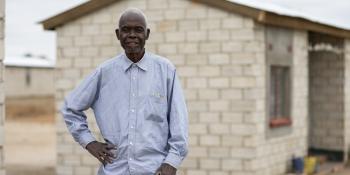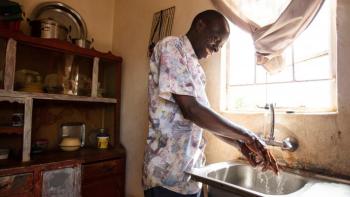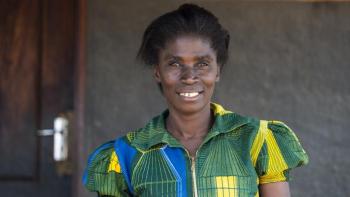
Partnering to create a community
The sounds of children running, playing, laughing, reverberate in and around the tidy rows of cement block houses.
Not long ago, the land these houses sit on in Kabwe, in central Zambia, was undeveloped. Today, it is home to dozens of families who have partnered with Habitat.
Raphael sits under a mango tree reading the Bible in his native Bembe language, a book he received the day his home was dedicated. He compares this place to the Promised Land. “This is a miracle,” says Raphael, who used to live with his wife and grandchildren in a rundown structure with a grass roof. “No matter what I go through, as long as I have a house, then everything is OK.”
Habitat Zambia has partnered with the government to create this community of hope. “I am quite passionate about housing because I think it’s one thing that dignifies somebody’s life,” says Prince Chileshe, Kabwe’s mayor.
The Zambian government donated the land for the development of 150 houses, then called on Habitat Zambia to make it happen. Founded in 1984, Habitat Zambia has a proven track record, Chileshe says. “Having a vision or a dream and actualizing it are two different things. I can point to families that are happier because Habitat brought them better housing.”
Most of the families moving to the new community are from nearby Makululu, a crowded informal settlement of some 62,000 people living in substandard housing and unhealthy conditions. Families have better housing, sanitation and access to clean water. And unlike in Makululu, Raphael and his neighbors say they can catch their breath here. The air is fresher. Their worries are fewer.
Most of the families also have been touched in some way by HIV and AIDS. Today, more than 1.1 million Zambians are infected with HIV. “Three-quarters of the children in this community have parents who have died of AIDS/HIV-related illnesses. And we have double orphans — that is, both parents have died,” says Joyce Mbimbi, who works with Habitat Zambia’s program for vulnerable groups, which began in 1997 in response to the pandemic.
Caring for the children of this community often falls to grandparents and other relatives. Jonathan and his wife, for example, are raising seven grandchildren, several of whom are playing on a nearby swing set.
“It is hard for them,” says Jonathan. “But the house and Habitat have brought them hope.”


